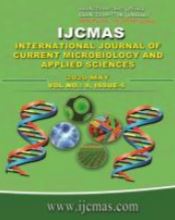


 National Academy of Agricultural Sciences (NAAS)
National Academy of Agricultural Sciences (NAAS)

|
PRINT ISSN : 2319-7692
Online ISSN : 2319-7706 Issues : 12 per year Publisher : Excellent Publishers Email : editorijcmas@gmail.com / submit@ijcmas.com Editor-in-chief: Dr.M.Prakash Index Copernicus ICV 2018: 95.39 NAAS RATING 2020: 5.38 |
The present study was conducted to assess the effect of composite culture of Azotobacter and Phosphate solubulizing bacteria with different combinations of organic, inorganic fertilizations on growth performance of in vitro propagated Banana, cv. Grand Naine. The in vitro rooted plantlets were hardened and acclimatized by using different treatments (five treatments comprising of inoculation of composite culture, vermicompost and Inorganic fertilization) carried out in CRD replicated four times. Propagation studies on primary hardening showed cocopeat was the best medium for primary hardening in terms of percentage survival of plantlets (100.00 %). Plantlets showed significantly highest height (9.50 cm), leaf number (2.80 per plantlet), girth (4.50 mm) when inoculation was given along with 25%NPK (organic) + 75% NPK (inorganic) in primary hardening. Similarly during secondary hardening, inoculation + 25%NPK (organic) + 75% NPK (inorganic) recorded best results in terms of plantlet height (20.45 cm), plantlet diameter (11.60cm) no. of leaves (5.25), length of primary roots per plantlet (12.32 cm). Maximum survival during secondary hardening (100.00 %) with composite culture inoculation whereas in other treatments survival percentage ranged from 87.5-93.5%. Nitrogen uptake by banana significantly increased from 9.17 at control to 28.21 mg per plantlet at inoculation + 25%NPK (organic) + 75% NPK (inorganic). For hardening and acclimatization of in vitro propagated banana, cv Grand Naine, composite culture + 25%NPK (organic) + 75% NPK (inorganic) showed overall superiority being the best treatment.
 |
 |
 |
 |
 |